- Home
- Steven Becker
Wood's Reef
Wood's Reef Read online
Prologue
Key West, October 27, 1962
“November, 2442. Truman ATC. Low on fuel, over,” the pilot radioed to the air traffic controller. His hands sweated as he waited, hoping the air traffic controller would respond quickly
“Truman ATC, N2442. Can you make Key West, over.”
“Negative. Fuel is low. Truman, request permission to jettison cargo, over.”
“N2442, Truman ATC, if no alternative, permission to jettison granted. Mark location, over.”
“Roger Truman, will do. Permission to land, over”
“N2442, Truman ACT. Roger, runway 21 from west. Please note east wind at 18 knots. Do you require emergency equipment, over.”
“Negative Truman, just overweight. Copy that runway 21 from west. ETA twelve minutes.”
“N2442, Truman ATC. Roger that. Call back when you have feet dry and visual.”
The jet took a wide turn toward the west to look for a good spot to jettison its cargo. Below it, the late-afternoon sun clearly showed the transitions in color between deep water and shallow. The darker spots indicated deep water — what he was looking for. It was safer to drop the munitions he carried in deeper water. At the apex of his turn, the pilot spotted a 100-yard-long dark brown line indicating a trench. That was the spot. With the low fuel alarm sounding, he dropped altitude to 500’, and air speed to just short of a stall. The bomb doors opened.
Seconds later, two bombs broke the surface of the water and quickly sank to the bottom.
***
The jet taxied to a stop by the service hanger, and two crewmen looked up from their card game, reluctant to leave the shade. Finally they stood and walked out. The jet and tarmac shimmered in the heat as they made their way to the pilot.
“Heard you had some trouble out there,” Machinist Mate Woodson said to the pilot.
“Spent too much time chasing that Russian B-29 sub off San Juan. We forced her to surface, but I had to stay on site. Took a lot of fuel with that payload.” The pilot climbed down from the opened canopy, the tropical sun reflecting off his visor made the machinist squint. “Had to drop two bombs to get light enough to make it back.”
Aviation Ordnanceman Jim Gillum pressed the release outside the cargo doors and looked in. “You dropped two nukes.”
The pilot came around and looked inside the bomb bay door, surprised. “Well, they must have been loaded wrong then. The nukes should have been on the sides, not the middle.” He wiped the sweat from his brow with his sleeve, suddenly worried. He’d thought he made it home safely, but this … this was a complication. “This is big trouble boys. There are all kinds of unexploded ordinance at the bottom of the sea, but not nukes.”
Joe Ward was due a promotion, and had no intention of letting this get in his way. He started his less than stellar career as a Naval Aviator at the end of the Korean War. “This is your fault, not mine. Just check them in like they should have been loaded, fudge the paperwork — whatever you have to do. Just make sure no one knows.”
“We can’t just leave two nukes sitting out there,” Woodson said, shocked.
“Why not. Come on Wood. You know they’ll send a demolition team out there as soon as this whole thing cools off and either blow them or bring them back here for disposal,” Gillum said.
“Bullshit,” Wood retorted. “They’ll sit down there until the wrong person finds them.”
“Hopefully by the time they figure there was a mistake in the paperwork, we’ll be long gone,” Ward walked towards the shade of the hanger, helmet cradled under his arm.
“I hope so for your sake.” Wood turned towards Gillum. “You can wipe the brown off your nose now. That son of a bitch doesn’t even know your name. Ward there, he’s one of those guys that’s just putting this on his resume to run for office - take his old man’s congressional seat.”
“Wood. Maybe that’s the difference between me and you. I’m making allies, you’re pissing them off.”
“You think he cares about a nuke sitting on the bottom of the ocean? That thing blows, it’ll kill everything that swims for miles.”
Chapter One
Spray coated the windshield as the trawler pulled up to the first buoy. The wind was rising as quickly as the barometer was falling. It wasn’t forecast as a hurricane, but it was blowing 30 knots now, and that was enough to take precautions.
“Tru. First trap, 100 feet out!” The command barely audible over the noise of the wind and motor.
Trufante leaned his 6’5 frame away from the protection of the wheelhouse. He spotted the buoy bobbing on top of a whitecap, breathed in, and faced the inevitable spray. His knee slammed into the gunwale as the wave took the boat, and the bow fell. A stream of spray came over the side, drenching him. He extended the gaff to reach the buoy with one foot in the air, leaning over the gunwale to gain as much reach as possible. The hook grabbed the line and he pulled the gaff in until he could reach the line with his free hand. With a practiced twist he wound the line onto the pulley. The winch motor groaned as it took the load, pulling the trap off the bottom. Trufante guided the trap onto the stainless steel runners.
“This is hardly worth it, dude. There’s one lobster in here. My Cajun ass should be on a barstool, not out here in this crap.” He untied the knot holding the door open and extracted the lobster. “Pretty small, too.”
Mac grunted. “Forget about the lobster. We need to get the traps up and stack them. This wind picks up any more, they’ll fill with sand and we’ll lose them.”
The conversation was over, and Mac steered toward the next buoy. They worked in an uncomfortable silence for the hour it took to pull the twenty remaining traps.
“How many we got?” Mac asked as the last trap came over the side.
“Probably in the neighborhood of forty.” Trufante dumped the last lobster in and closed the cooler lid. “Can we get out of here now? You know we’re the only ones crazy enough to be out here in this.” He winced as a wave broke over the bow. “Storms got a bite meaner than my grandma’s Cajun pepper sticks.”
“Say what you want. It’s enough to keep you in beer till this blows through, and I won’t have to spend a bunch of money replacing traps.” Mac hit the wiper switch, and the blades dragged against the plexiglass, rubbing the dried salt before the rainwater started to dissolve it and wash it away.
***
The waves and tide were in their favor now. Trufante went below and came out with a beer. “Finally calm enough I can drink this instead of wear it. What’s that?” He pointed toward the Seven Mile Bridge, where a piling indicated a sandbar, exposed only at low tide. Two yellow dots were visible. Mac altered his course and steered carefully toward the area, the yellow dots now growing into two people in rain slickers, frantically waving. Next to them was a boat run aground.
“Crap. Idiots.”
“Yeah, you think? What the hell are they doing out here in this mess?” Trufanate was close enough to see the hull now.
Mac eased his boat up to the edge of the sandbar, invisible in the storm-churned water. He studied the surface, watching the flow that would indicate the deep channel, and waited for his chance. In the meantime, he took the microphone and held it out, signaling for them to call on their radio. The man shrugged his shoulders.
“See if they need help,” he told Trufante as he pulled the throttles back to neutral. He quickly pulled back into reverse, making a correction for the incoming tide. “This tide’s smoking. Hurry up.”
Trufante went forward and yelled at the couple. Mac couldn’t hear the conversation over the wind but had already made his decision. A nicer day, he might have passed right by knowing the tide would float the boat in an hour or two. With this weather he knew he would have to help.
“What�
��s the deal?” he asked Trufante as the Cajun slid behind the protection of the wheelhouse.
“Cute girl. Dude’s an ass, though.”
“Thanks, that wasn’t quiet the answer I was looking for. Think you can tell them to sit tight. We’ll toss a line and get them off. They need to stay out of the boat. This is going to be dicey. After we pull it off, we can pick them up on the beach. Take that line and toss it, tell him to tie it to the loop on the bow, not the cleat. He needs to secure it where the trailer winch hooks to. If we try and drag this off stern-first, it’ll swamp. We’ll have to spin it.”
Trufante grabbed the coiled line and headed toward the bow. There, he laid it on the deck and peeled off enough line to make a dozen loops, which he held in his right hand. He wound up and tossed the line, watching the wind catch and stall its progress as it unraveled. It fell into the water twenty feet short of the couple. The man yelled for him to throw again.
Trufante was about to pull the line in when he heard Mac on the hailer. “Go get it. We don’t have time to be messing around, here. You have a radio? Go to channel 16.”
The couple faced each other, clearly fighting. After a few seconds, the man shook his head and waded into the water. He retrieved the line and followed Mac’s instructions to tie it off.
“Get clear!” Mac shouted. He backed the boat into deeper water and turned perpendicular to the grounded boat. Both men lost their footing as the engine vibration resonated through the deck. The line came tight with a crack increasing the stress on the engines even more. The boat started to turn on the sandbar. Mac eased on the throttle, allowing the line to go slack as he changed course. The line cracked again as it came taught. The boat didn’t move.
“What now? That thing ain’t movin’.” He watched as Mac backed the boat down. He started to swing the boat back and forth.
“Just got to break the suction of the sand. Just a minute.” He revved the engines and steered straight.
The couple watched as the boat slid off the sandbar, catching in the current and swinging dangerously close to the old span of the bridge. The man was screaming something as Mac pushed down on the throttle, gaining control of the boat.
“I’m going to put you on their boat,” he said to Trufante. “Make sure it starts, and pick them up. Follow me into the gas dock at Boot Key.” Mac turned the boat, allowing the current to bring the smaller boat toward his as Trufante brought in the slack line.
The boats were almost touching when Trufante vaulted over the gunwale, landing on the smaller boat. He went to the helm and started the boat. Both boats drifted together as he leaned over the bow to untie the line.
“Can’t get it,” he yelled at Mac. “This guy can’t even tie a knot. It tightened down on itself.”
“Screw it.” Mac said, going for a knife. He cut the line, leaving ten feet drifting in the water. “Tell him he owes me.”
Trufante reversed and nosed into the sandbar.
Chapter Two
It had taken three days for the storm to pass, but they were finally back out on the water. Mac nodded at Trufante to drop the first trap. The sun dappled the surface of the calm water, slowly undulating with the tide. Mac watched, a rare smile crossed his face, as concentric rings marked the traps’s point of entry.
Trufante baited the trap and slid it into the water with a practiced movement that belied the weight of the trap. Mac engaged the engine and moved toward the next spot, 200 feet away, where they repeated the procedure. It often took years to learn the shallow Gulf waters, a desert of sand, turtle grass waving with the current. Knowing the bottom features was the key and Mac had put in his time to learn the locations of the rock piles, potholes and ledges that attracted life in the otherwise-barren bottom. This was different water than the more popular Atlantic side, where the famous reef ran. Dropping five feet from the adjacent bottom, the broken rocky ledge ran almost a quarter mile. Two hundred yards of green and blue buoys marked Mac’s traps. The buoys bobbed in a single line parallel with the trench, dark spots against the sparkle of the late-morning sun on the water. It was a few more miles than most boats liked to run to set their traps, and past the comfort zone of the tourist boats he tried to avoid. Mac didn’t care about the time and fuel. He loathed the congestion of buoys and tourists closer in. Besides, there were more lobster here.
An hour later, with all the traps soaking, he ran his hand through his receding hair and yelled out to Trufante, “Hey Tru, drop the anchor here. I want to dive and see if there’s any grouper.” There was a good chance there would be game fish here. They sought bait, which congregated around good bottom like this.
He went back to the transom and donned mask, fins, and a weight belt. As he went over the side, Trufante handed him the speargun. He bobbed on the surface, taking larger and deeper breaths, then pivoted at the waist and kicked through the surface. A half-dozen effortless kicks later he was at eye level with the ledge. Nothing in sight, and his lungs feeling the lack of air, he finned back up and repeated the process.
Just as he was about to dive he saw a quick glimmer of sun on glass, just east of their position. Strange, he thought, you don’t see many boats out here. The boat was moving close enough that he could just make out the orange hat of the driver. “Hey Tru. Keep an eye out there.” He pointed at the boat.
Mac dove again. Visibility was good, and he saw a line moving slowly over the sand as he descended. The black grouper finned in the current, waiting for prey, its checkered pattern camouflaging it from the side, though it was easily visible from above. He held his breath, holding level and just above the fish. Frozen in the water, he became a part of the landscape. The fish never knew he was there until he released the trigger. The four foot spear shot from the gun and embedded itself behind the grouper’s head. The fish tried to make a run, but Mac held the line connecting the gun and spear, looping in around his hand for leverage. He kicked to the surface and handed the line to Trufante on the transom to retrieve the fish.
“There’s a couple more down there.” He took back the empty shaft, slid it into the gun, and pulled back the rubber tubing. “I’ll be back.”
As he dropped closer to the bottom, he began to notice a dull sheen in the sand. He wasn’t sure what he was looking at, but he knew it didn’t belong here. He surfaced and repeated his breathing sequence, then dove back down toward the metal object. He dusted the sand away from it, then raced for the surface, breaking through the water and yelling for Trufante to hand him a weighted buoy.
“Hit the Man Overboard button on the GPS,” he yelled as he swam towards the dive platform. He grabbed the buoy from Trufante’s outstretched hand and submerged again. He located the object, removed the small marker buoy clipped to his weight belt and released it. The line unwound as the small foam float ascended, the small fishing weight rested on the bottom marking the spot. He finned to the surface and climbed back to the dive platform.
Back on the boat, he adjusted the GPS to make sure the coordinates marked the buoys spot. Right over the buoy. He navigated through the GPS menus, saving the spot. He grabbed his phone and hit the INavX GPS app. He awkwardly navigated the program, tapping harder on the screen until the program finally submitted and saved the spot. Not a fan of technology, he did appreciate redundant systems. GPS numbers were irreplaceable, marking underwater features that were invisible to the naked eye. He had started the process of putting his numbers into the iNav program which would automatically sync with his computer at home.
He knew what he’d found, and wanted to ensure he could find it again. Trufante snagged the buoy line with the gaff and wound the line around it as Mac increased speed, heading for his next trap line.
Chapter 3
The pearly dew on the ice-cold Corona bottle shimmered in the heat. It was the hottest part of the day, late October, and it still got Africa hot.
They’d spent the last two hours checking their other traps, and Mac would have been heading in by now to offload his catch, but that piece
of metal intrigued him. He wiped the bottle on his brow and tossed one to Trufante, then pulled the GPS coordinate up and hit the Go To button. The course and distance came up as he throttled up, and he followed the course indicated on the display.
Ten minutes later he pulled up on the site. Trufante shot him a questioning look as Mac yelled to toss the anchor.
“What up, boss? Why are we back here?”
“Something down there I need to check on,” Mac said as he tossed him another beer to keep him distracted.
***
Mac was suited up with scuba diving gear this time. His back to the water he rolled over the side into the water. He quickly found the metal object and released the buoy. The GPS was good to about thirty feet, but he needed to be right over the top of it for what he had planned.
“Pull the anchor and set the stern on top of that buoy.” He pointed to the red ball bobbing off the starboard side. “Right on top. No slack in the anchor line.”
Trufante gave him a questioning look, no doubt thinking his day should have been over.
“Just do it.” Mac pulled himself onto the dive platform and waited for Trufante to find the mark and reset the anchor.
The current had picked up since this morning, the tide moving out swiftly, and Trufante had a hard time getting on top of the buoy. Mac’s patience didn’t last long. He dumped his gear, went to the bow and released the anchor line from the cleat. The line slipped through his hands as he signaled Trufante to back down on the buoy. Line tied off again, he watched as the boat settled right over the buoy.
He grabbed the pressure washer sprayer and hooked the end to a quick disconnect on the transom. The pressure washer was a recent addition to the custom boat — great for a quick cleanup, though he was going to use it for something else today. He had fifty feet of hose and the bottom was thirty feet down. That gave him twenty feet for maneuvering. He geared up and was back in the water.

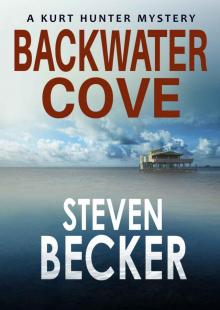 Backwater Cove
Backwater Cove Storm Surge: A Fast Paced International Adventure Thriller (Storm Thriller Series Book 3)
Storm Surge: A Fast Paced International Adventure Thriller (Storm Thriller Series Book 3)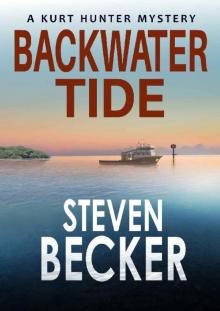 Backwater Tide
Backwater Tide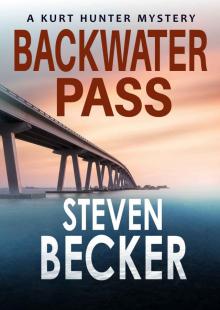 Backwater Pass
Backwater Pass Backwater Flats
Backwater Flats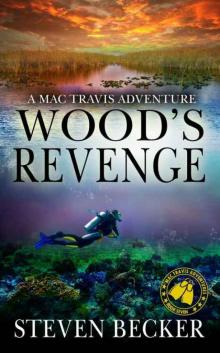 Wood's Revenge
Wood's Revenge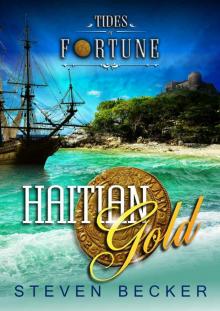 Haitian Gold
Haitian Gold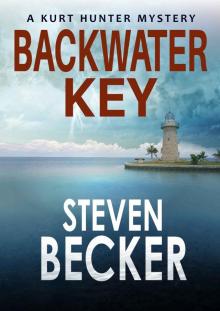 Backwater Key
Backwater Key Wood's Tempest
Wood's Tempest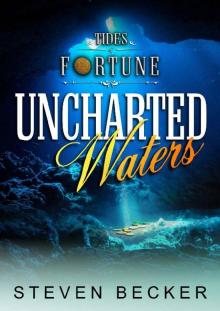 Uncharted Waters
Uncharted Waters Tuna Tango
Tuna Tango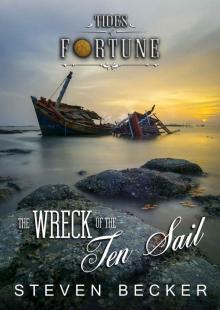 The Wreck of the Ten Sail
The Wreck of the Ten Sail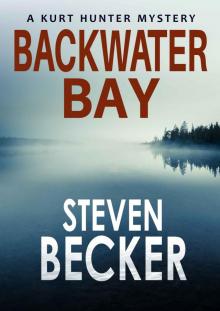 Backwater Bay (Kurt Hunter Mysteries Book 1)
Backwater Bay (Kurt Hunter Mysteries Book 1) Storm Clouds
Storm Clouds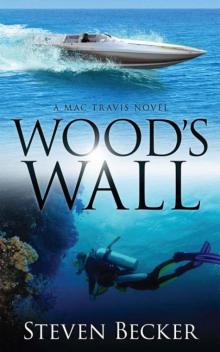 Wood's Wall
Wood's Wall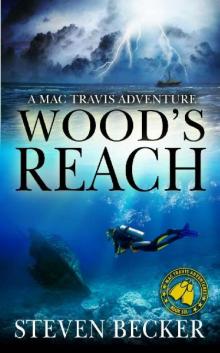 Wood's Reach
Wood's Reach Wood's Fury
Wood's Fury Storm Rising
Storm Rising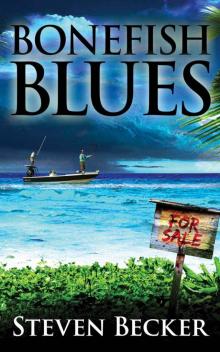 Bonefish Blues
Bonefish Blues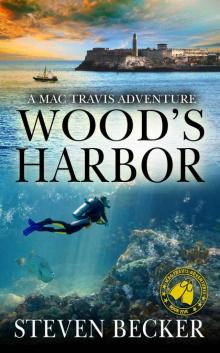 Wood's Harbor: Action & Sea Adventure in the Florida Keys (Mac Travis Adventures Book 5)
Wood's Harbor: Action & Sea Adventure in the Florida Keys (Mac Travis Adventures Book 5)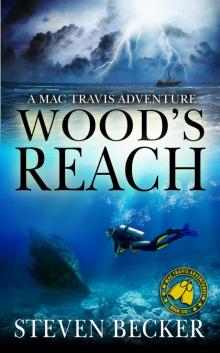 Wood's Reach: Action & Sea Adventure in the Florida Keys (Mac Travis Adventures Book 6)
Wood's Reach: Action & Sea Adventure in the Florida Keys (Mac Travis Adventures Book 6)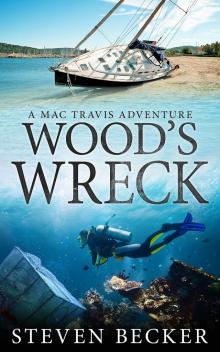 Wood's Wreck
Wood's Wreck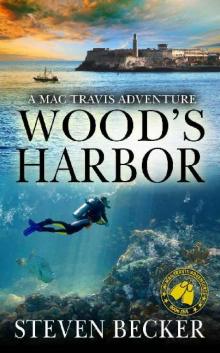 Wood's Harbor
Wood's Harbor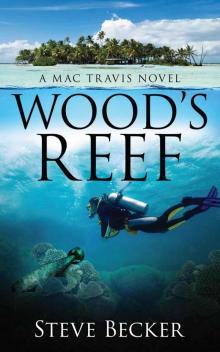 Wood's Reef
Wood's Reef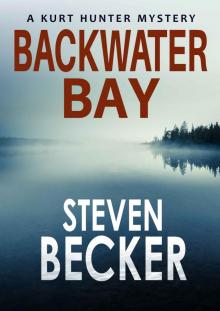 Backwater Bay
Backwater Bay